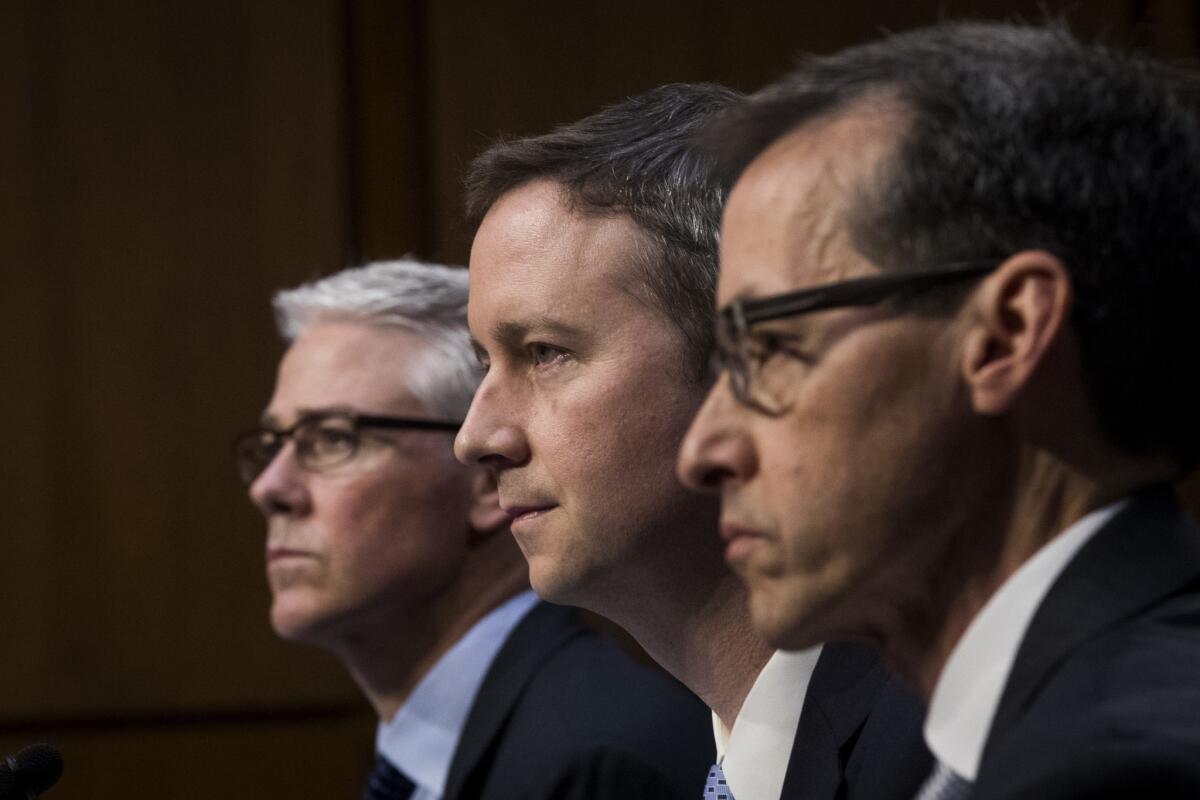Why Facebook, Twitter and Google are suddenly taking Russian meddling very seriously

At first, the Internet giants downplayed the role they played in Russia’s election meddling.
Facebook founder Mark Zuckerberg famously said it was “crazy” to think fake news influenced the campaign. Twitter said it can’t be the arbiter of truth. And Google only recently revealed Russian agents bought ads to spread disinformation after saying there was no evidence of the sort.
But by Tuesday, when faced with a sobering appearance before the Senate Judiciary Committee, the three Silicon Valley heavyweights took turns underscoring the gravity of the attacks on American democracy and pledged to work harder to prevent it from happening again.
“We take what happened on Facebook very seriously,” said Facebook’s lead attorney, Colin Stretch. “The foreign interference we saw was reprehensible.”
The foreign interference we saw was reprehensible.
— Colin Stretch, Facebook’s lead attorney
Whether the gestures appeared credible or not will go a long way in determining how much an increasingly impatient Congress will regulate a technology industry that has amassed considerable power.
The three companies came to the hearing — the first of three on Capitol Hill over two days — with data showing how badly they underestimated the scope of Russia’s interference.
Facebook said 126 million users were served content from a Russian troll farm, the Internet Research Agency, more than 10 times the original estimate. Twitter said Kremlin-linked agents sent more 131,000 messages. And Google said Russian operatives uploaded more than 1,000 videos on YouTube.
Although the instinct in Silicon Valley is to want to police itself, critics question whether the social media companies can be trusted to do so after taking so long to disclose more about the extent their platforms were exploited.
“When the response is seen as half measures and denials, it only makes the situation worse,” said Scott Galloway, a professor of marketing at NYU Stern School of Business and author of “The Four: The Hidden DNA of Amazon, Apple, Facebook and Google.”
“To date, they’ve tried to minimize and deflect,” Galloway added. “Meanwhile, we keep finding it’s getting worse and worse.”
Galloway said the companies should have sent their CEOs to the hearings to deliver a forceful pledge to stop foreign interference regardless of cost. Twitter was represented by Sean Edgett, acting general counsel, and Google sent Richard Salgado, director of law enforcement and information security.
Galloway was also discouraged by the way the companies tried to downplay the reach of Russian meddling by highlighting how it represented just a small percentage of content on their platforms.
Galloway said Facebook, Twitter and Google should have taken a cue from the late James E. Burke, who led Johnson & Johnson during the 1982 Tylenol poisoning crisis that claimed seven lives. Burke ordered the recall of millions of bottles of pills and stopped all advertising.
“He didn’t come out and say this is just a fraction of our content and it wasn’t a big deal,” Galloway said. “It’s the benchmark for how to handle a crisis.”
Tech companies such as Facebook, Twitter and Google have long benefited from Washington’s laissez-faire approach to them — applying outdated rules that don’t address the challenges faced today. Part of the reasoning was to shield innovation from the heavy hand of government.
The companies are not legally responsible for most of the content that shows up on their platforms. “At our heart we’re a tech company; we hire engineers. We don’t hire reporters, no one’s a journalist, we don’t cover the news,” Sheryl Sandberg, Facebook’s chief operating officer, told Axios earlier this month.
Calls are growing for that to change. As the primary gatekeepers of news and information today, critics say the big platforms should be regulated like media companies, which are liable for harmful material.
The first salvo in attempting to rein in the tech giants came earlier this month when Senate democrats Amy Klobuchar of Minnesota and Mark Warner of Virginia along with Republican Sen. John McCain of Arizona unveiled legislation called the Honest Ads Act, which would make political ads on social media subject to the same rules as on traditional media.
That means disclosing the origins of political ads so that the public can’t be misled.
Facebook has welcomed the calls for transparency despite resisting it in the past as impractical. But pressure was mounting on the social network because of the proliferation of political dark posts — anonymous ads such as the ones bought by the Internet Research Agency that were designed to widen divisions between Americans.
Facebook also said Tuesday it would double its number of employees tasked with removing objectionable content to 20,000.
That follows other pledges by Facebook and Twitter to inject more transparency into their political advertising business by forcing purchasers to disclose who’s paying for ads and who they’re targeting. Google also removed media company Russia Today from its premium lineup of YouTube channels for advertisers.
Actions like that may help the companies preserve the regulatory status quo that has allowed them to grow into multibillion-dollar behemoths.
Lawmakers are now ratcheting up the pressure, demanding that Facebook, Twitter and Google give them a reason to entrust them with protecting one of America’s most sacred institutions.
“Can you come to us and say, ‘We have accomplished X, and therefore you, as a Congress, don’t need to worry about legislating in this space or creating regulations or holding more hearings, because we have now got America’s back?” Democratic Sen. Sheldon Whitehouse of Rhode Island asked during Tuesday’s hearing.
Follow me @dhpierson on Twitter
ALSO
Consumer protection chief appeals directly to Trump in bid to save class-action lawsuit rule
Six women accuse filmmaker Brett Ratner of sexual harassment or misconduct
More to Read
Inside the business of entertainment
The Wide Shot brings you news, analysis and insights on everything from streaming wars to production — and what it all means for the future.
You may occasionally receive promotional content from the Los Angeles Times.











